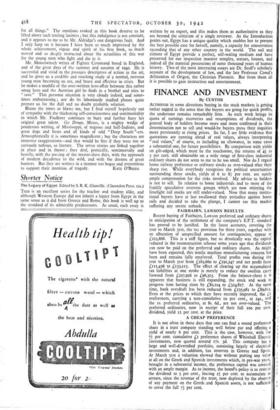FINANCE AND INVESTMENT
By CUSTOS
ALTHOUGH in some directions buying in the stock markets is getting rather ragged in the sense that the buyers are going for quick profits, the undertone remains remarkably firm. As each week brings its quota of earnings recoveries and resumptions of dividends, the general body of holders become more and more confirmed in their determination not to sell and would-be buyers press their inquiries more persistently at rising prices. So far, I see little evidence that quotations are running ahead of real values, always interpreting "real values," of course, as including an allowance, in some cases a substantial one, for future possibilities. By comparison with yields on gilt-edged, which must be the touchstone, the returns of 44 to 5 per cent. still obtainable on a wide range of first-class industrial ordinary shares do not seem to me to be too small. Nor do I regard home railway preference or ordinary stocks as over-valued after their sharp rise. While everybody recognises the political uncertainties surrounding these stocks, yields of 6 to 84 per cent. are surely ample compensation for the risks involved. My advice to holders is not to sell. In relation to home industrials and to most of the frankly speculative overseas groups which are now enjoying the limelight rail stocks are still under-valued. Now that many institu- tional buyers have at last swallowed their prejudice against home rails and decided to take the plunge, I cannot see this market suffering any severe setback.
FAIRBAIRN, LAWSON RESULTS
Recent buying of Fairbairn, Lawson preferred and ordinary shares in anticipation of the settlement of the company's E.P.T. standard has proved to be justified. In the latest accounts, covering the year to March 31st, the tax provision for three years, together with an allocation of unspecified amount for contingencies, appear at £225,868. This is a stiff figure, but so drastically was the capital reduced in the reconstruction scheme some years ago that dividends can now be paid on the preferred and ordinary shares. As might have been expected, this textile machine manufacturing concern has been and remains fully employed. Total profits rose during the year to March 31st from £163,660 to £191,247 and net profit from £111,436 to £133,115. The effect of clearing up the accumulated tax liabilities at one stroke is merely to reduce the swollen carry forward from £207,926 to £96,315. From the balance-sheet it is apparent that business is still expanding, the stock and work in progress item having risen by £80,104 to £324,827. At the same time, bank overdraft has been reduced from £235,981 to £89,612. Even at the prices to which they have recently improved, the £1 preferences, carrying a non-cumulative io per cent., at 24$., and the is. preferred ordinaries, at 8s. 6d., are not over-valued. The preferred ordinaries, now in receipt of their full boo per cent. dividend, yield 12 per cent, at the price.
A CHEAP PREFERENCE It is not often in these days that one can find a sound preference share in a trust company standing well below par and offering a yield of nearly 6 per cent. This is the case, however, with the 74 per cent. cumulative £i preference shares of Whitehall Electric Investments, now quoted around 17s. 3d. This company has a large and well-diversified portfolio, consisting largely of electrical investments and, in addition, has interests in Greece and Spain. At March 315t a valuation showed that without putting any value at all on the Greek and Spanish investments which, in pre-war years, brought in a substantial income, the preference capital was covered with an ample margin. As to income, the board's policy is to restrict the dividend to 5 per cent., leaving 24 per cent, to accumulate as arrears, since the revenue of the trust, now depleted by the absence of any payment on the Greek. and Spanish assets, is not sufficient to cover the full 74 per cent.


























 Previous page
Previous page